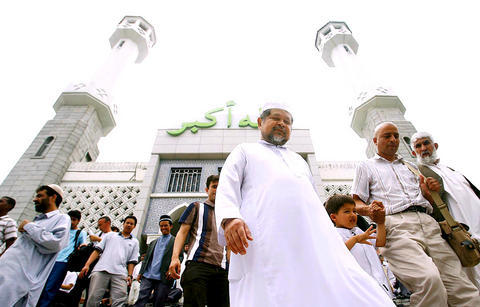Afghan elders yesterday negotiated with the Taliban to win the release of 22 kidnapped South Koreans as the latest militant deadline passed without word on their fate or news of progress.
A South Korean presidential envoy was scheduled to arrive yesterday for talks with Afghan President Hamid Karzai and other top officials on the crisis.
No breakthrough came in a round of telephone calls late into Thursday night that resumed yesterday, officials said.

PHOTO: EPA
Negotiators were struggling with conflicting demands made by the kidnappers, including the release of Taliban prisoners and ransom money.
"We hope we will have a good result, but I don't know if they will be released today. I don't think they will be," Shirin Mangal, a spokesman for the governor of Ghazni Province where the captives were taken, said yesterday.
A noon deadline -- the latest of several ultimatums given by the captors -- came and went without fresh word of the hostages' fate. Calls to a Taliban spokesman went unanswered.
Previous deadlines have passed without incident.
In Seoul, a South Korean Foreign Ministry official, speaking on condition of anonymity because of the matter's sensitivity, said the captives were still believed to be safe and that officials were trying to get medicine and other items delivered to them.
Baek Jong-chun, a senior South Korean official, was expected to meet Karzai and other officials to discuss specific measures to free the hostages, the official said.
Tribal elders and clerics who are respected by the people of the Qarabagh district where the Koreans were taken have been conducting negotiations by telephone with the captors for several days.
"There are still a lot of problems among them," Qarabagh police chief Khwaja Mohammad Sidiqi said.
"One says, `Let's exchange them for my relative,' the others say, `Let's release the women,' and yet another wants a deal for money," he said.
Qari Yousef Ahmadi, a Taliban spokesman, on Thursday reiterated a demand for the release of Taliban prisoners and a threat to kill more of the hostages.
One of the group of abducted South Koreans, 42-year-old pastor Bae Hyung-kyu, was found slain with multiple gunshots on Wednesday in Qarabagh.
"If Kabul administration does not solve our problem ... then we do not have any option but to kill Korean hostages," Ahmadi said.

LIMITS: While China increases military pressure on Taiwan and expands its use of cognitive warfare, it is unwilling to target tech supply chains, the report said US and Taiwan military officials have warned that the Chinese People’s Liberation Army (PLA) could implement a blockade within “a matter of hours” and need only “minimal conversion time” prior to an attack on Taiwan, a report released on Tuesday by the US Senate’s China Economic and Security Review Commission said. “While there is no indication that China is planning an imminent attack, the United States and its allies and partners can no longer assume that a Taiwan contingency is a distant possibility for which they would have ample time to prepare,” it said. The commission made the comments in its annual

DETERMINATION: Beijing’s actions toward Tokyo have drawn international attention, but would likely bolster regional coordination and defense networks, the report said Japanese Prime Minister Sanae Takaichi’s administration is likely to prioritize security reforms and deterrence in the face of recent “hybrid” threats from China, the National Security Bureau (NSB) said. The bureau made the assessment in a written report to the Legislative Yuan ahead of an oral report and questions-and-answers session at the legislature’s Foreign Affairs and National Defense Committee tomorrow. The key points of Japan’s security reforms would be to reinforce security cooperation with the US, including enhancing defense deployment in the first island chain, pushing forward the integrated command and operations of the Japan Self-Defense Forces and US Forces Japan, as

IN THE NATIONAL INTEREST: Deputy Minister of Foreign Affairs Francois Wu said the strengthening of military facilities would help to maintain security in the Taiwan Strait Japanese Minister of Defense Shinjiro Koizumi, visiting a military base close to Taiwan, said plans to deploy missiles to the post would move forward as tensions smolder between Tokyo and Beijing. “The deployment can help lower the chance of an armed attack on our country,” Koizumi told reporters on Sunday as he wrapped up his first trip to the base on the southern Japanese island of Yonaguni. “The view that it will heighten regional tensions is not accurate.” Former Japanese minister of defense Gen Nakatani in January said that Tokyo wanted to base Type 03 Chu-SAM missiles on Yonaguni, but little progress

NO CHANGES: A Japanese spokesperson said that Tokyo remains consistent and open for dialogue, while Beijing has canceled diplomatic engagements A Japanese official blasted China’s claims that Japanese Prime Minister Sanae Takaichi has altered Japan’s position on a Taiwan crisis as “entirely baseless,” calling for more dialogue to stop ties between Asia’s top economies from spiraling. China vowed to take resolute self-defense against Japan if it “dared to intervene militarily in the Taiwan Strait” in a letter delivered Friday to the UN. “I’m aware of this letter,” said Maki Kobayashi, a senior Japanese government spokeswoman. “The claim our country has altered its position is entirely baseless,” she said on the sidelines of the G20 summit in Johannesburg on Saturday. The Chinese Ministry